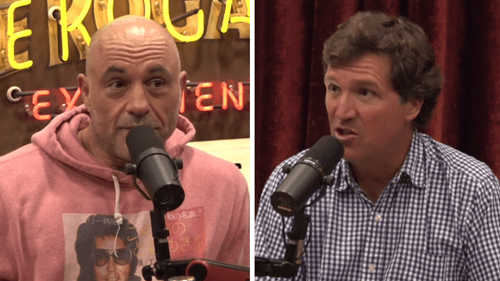
Joe Rogan and Tucker Carlson sat down for a wide-ranging three-hours-plus discussion last week, touching on everything from UFOs, spirituality, and religion; from artificial intelligence costs and benefits to questioning 'science' consensus; and from government secrecy and lying to the threat to democracy driven by our domestic intelligence agencies.
They begin by discussing a recently leaked government project named "Project Aqua" which involves advanced aerospace vehicles and their interaction with humans, leading to medical injuries and even deaths.
"Here's what we know is that US servicemen have died as a result of contact with or being in the proximity of these vehicles and we know that because there are a lot of suits working their way through the VA system."
The conversation turns specifically to the nature of UFOs, suggesting they could be more than just physical or technological phenomena, potentially tied to spiritual or supernatural origins.
On supernatural explanations for UFOs:
"It's pretty clear to me that they're spiritual entities whatever that means are Supernatural and which is to say Supernaturals means above the natural above the observable uh nature."
The troublesome twosome highlighted how certain revelations or events can lead to a deeper questioning of what is commonly accepted as truth, fostering a mindset of skepticism and curiosity.
On questioning assumptions:
"I began a process still ongoing of reassessing a lot of other things like okay well if that was not true what else is not true and what else that they told me was a conspiracy theory might actually have some basis in fact."
Rogan reiterates his long-held fear of the potential for artificial intelligence to evolve beyond human control, transforming into a new form of life that could dramatically alter our understanding and existence.
On artificial intelligence and humanity's future:
"Digital Life it's going to give birth to a new life form and I think we're real close to that I think we're way closer than that to that than most people would ever want to admit."
Carlson then opens up on his views about the current state of politics and society, particularly criticizing the dishonesty and manipulation in governmental and media structures.
The perennial topic of power corruption comes up next, with the two men comparing the intoxication of leadership to the historical behaviors of cult leaders and tyrants.
On power and control:
"It's very intoxicating and it's common in that it's always existed throughout human history. It's a thing that people do when they get power—they abuse the fuck out of it."
On ideological indoctrination:
"Woke is clearly a cult; it's a mind virus... it's very similar to all kinds of religions... everybody has to believe very specific things and you can't differ from the doctrine."
The pair elaborate further on the influence of ideologies that suppress dissenting views and the impact of governmental lies on public trust, emphasizing the importance of honesty in communication, slamming the government's tendency to prioritize power over transparency and the well-being of its citizens.
On the facade of democracy:
"When they stand up and pass a $60 billion funding bill for Ukraine when 70% of the population doesn't want it... and they call it a democracy, that will drive you insane because it's just too dishonest."
On personal and governmental honesty:
"Maybe just assess everything that way - is someone lying? I don't care what your justification for it is... You can't participate in lying... try to tell the truth all the time."
"You can't lie. You can't lie about anything, just don't lie about anything. Try to tell the truth all the time," he says.
"If you just stick with that, you get pretty quickly back to reason and order, don't you?"
Joe Rogan contunues by pointing out the themes of control and misinformation, particularly in the context of media, that are growuing more and more powerful. He points out the shift in what is considered mainstream media, highlighting the growing significance of platforms like Twitter and YouTube over traditional news outlets. Rogan stresses the increasing visibility of lies and the public's growing ability to discern truth from misinformation due to the accessibility of alternative information sources online.
On the problem with mainstream media:
"Mainstream media used to be CNN; it's not really anymore. Mainstream media is what in terms of the volume consumed, more people are consuming things on X [Twitter] than there are on anything else."
The former Fox News host exclaims his clear disdain for the manipulation and deceit he perceives at the highest levels of power.
"This is not self-government. You don't run this country, we do. Shut up and obey," says Carlson regarding what the reality of our government really is, adding that "what makes it particularly galling and hard to live with is when you call that system a democracy."
Rogan and Carlson also touch upon the effects of technology and social media on personal interactions and societal norms. They discuss the negative impacts of constant connectivity, lamenting the loss of meaningful face-to-face interactions.
"When people lie and when people bullshit and gaslight, it's more offensive now than it's ever been before," Rogan points out.
"The lies aren't sophisticated. It's something incredibly insulting and demeaning to tell me a lie when I know it's a lie."
And then the discussion gets ominously dark as the pair reflect on the re-authorization of the 'spying on Americans' bill (we note that the two gentlemen met before the bill was re-authorized).
'Kiddie Porn' blackmail fear...
Stunningly, Carlson tells Rogan that congressmen were "terrified" that intelligence agencies will frame them with "kiddie porn" if they openly opposed the "warrantless spying" bill.
Specifically, he says US lawmakers "told" him that they are "worried" about being punished by intel agencies if they oppose reauthorizing Section 702 of the Foreign Intelligence Surveillance Act (FISA).
"People don't say that because they're worried about being punished. They’re worried about someone putting kiddie porn on their computer. Members of Congress are terrified of the intel agencies. I'm not guessing at that. They've told me that — including people on the intel committee, including people who run the intel committee," Carlson said.
"The people whose job it is to oversee and keep in line these enormous, secretive agencies whose budgets we can't even know - their 'black budgets'," Carlson continued, raising his hands into air-quotes.
That it is "tyranny", not democracy, for "unelected people who are not accountable to anyone making the biggest decisions", Carlson raged, to force congressmen to support reauthorizing "warrantless spying" of American citizens because "they're threatened."
"They're the parents, the agencies are the children. They're afraid of the agencies. That's not compatible with democracy."
“It’s playing out in front of everyone, and no one cares and no one does anything about it,” Carlson said.
"I think the reason is because they’re threatened. And if you look at the committee chairman who allowed this shit to happen year after year, they’re all - and I don’t know, people say, ‘Oh, they’re compromised or being blackmailed,’ whatever. I don’t have evidence of that. But I know them. And they have all the things to hide. I know that for a fact."
“It’s not a stretch of imagination to imagine that, you know, some committee chairman who’s allowing warrantless spying on Americans to continue, or whatever abuse they’re allowing... It’s not impossible to imagine that some guy with a drinking problem or a weird sex life — and that’s very common, very common up there — that’s why they’re doing it. Because they don’t want to be exposed,” Carlson added.
“I said to somebody, a very powerful person, the other day, in a conversation in my kitchen, an elected official - holds a really senior position...
But I was like, ‘All these people are controlled. They’ve all got weird s*x lives, and all these things they’re hiding, and they’re being blackmailed by the intel agencies.’
And he said, and I’m quoting, ‘I know.’ I was like, okay, so at this point, we’re just sort of admitting that’s real? Like, why do we allow that to continue?”
Joe Rogan Goes Quiet as Tucker Carlson Drops Bone-Chilling Reality
— The Vigilant Fox 🦊 (@VigilantFox) April 20, 2024
“Members of Congress are terrified of the intel agencies. I’m not guessing at that. They’ve told me that, including people who run the intel committee.”
What Tucker said next was even more revealing.
“I said to… pic.twitter.com/yEjdxhxOp1
Finally, and in a more calming conclusion, Carlson reminisces about his unconventional childhood, emphasizing the value of communal meals and genuine conversations, which he contrasts starkly with the superficial interactions encouraged by social media platforms. Rogan agrees, but fears we have gone to far to ever be able to come back.
On the value of personal interaction:
"When you get people in a club and you take their phones away and just have them just be actual human beings and not be filming everything, just being completely trapped with this idea of capturing something and then putting it online, then you get to have a human experience."
The dialogue shifts to the topic of creativity and its survival in modern America.
On the state of creativity:
"Creativity, art has been completely destroyed and eliminated in the United States. There’s like, you can’t be creative if you’re not honest. It’s that simple, and we can’t be honest so there’s no creativity."
Carlson expresses a belief that true creativity cannot exist without honesty, asserting that a lack of genuine expression has led to a decline in artistic and cultural development, except in fields like comedy and music which still manage to thrive amidst societal constraints.
On the power of rhythm in music:
"I love the fact that they had two drummers... the architecture is rhythm and it’s the universal sound that every culture appreciates because it reflects something that’s pre-existing that’s in you."
On societal change and comedy:
"Comedy’s never been better. Amazing time. It came close, oh yeah, the walls got breached... It felt like, oh wow, you know, people can’t tell jokes anymore. We kept doing it."
Both hosts discuss the vitality of art forms that manage to operate outside the mainstream narratives, suggesting that these are crucial for maintaining a vibrant cultural landscape.
Overall, the discussion encapsulates a broad critique of contemporary societal issues, from government secrecy and the erosion of personal freedoms to the challenges facing creative expression and public discourse in the digital age.
Both Carlson and Rogan advocate for a more open, honest, and engaged society that values personal interaction and intellectual freedom above conformity and control.
"I'm going to go crazy because I just can't deal with the lying," Carlson concludes.
Watch the full three hour discussion below:
Joe Rogan and Tucker Carlson sat down for a wide-ranging three-hours-plus discussion last week, touching on everything from UFOs, spirituality, and religion; from artificial intelligence costs and benefits to questioning ‘science’ consensus; and from government secrecy and lying to the threat to democracy driven by our domestic intelligence agencies.
They begin by discussing a recently leaked government project named “Project Aqua” which involves advanced aerospace vehicles and their interaction with humans, leading to medical injuries and even deaths.
“Here’s what we know is that US servicemen have died as a result of contact with or being in the proximity of these vehicles and we know that because there are a lot of suits working their way through the VA system.”
The conversation turns specifically to the nature of UFOs, suggesting they could be more than just physical or technological phenomena, potentially tied to spiritual or supernatural origins.
On supernatural explanations for UFOs:
“It’s pretty clear to me that they’re spiritual entities whatever that means are Supernatural and which is to say Supernaturals means above the natural above the observable uh nature.”
The troublesome twosome highlighted how certain revelations or events can lead to a deeper questioning of what is commonly accepted as truth, fostering a mindset of skepticism and curiosity.
On questioning assumptions:
“I began a process still ongoing of reassessing a lot of other things like okay well if that was not true what else is not true and what else that they told me was a conspiracy theory might actually have some basis in fact.”
Rogan reiterates his long-held fear of the potential for artificial intelligence to evolve beyond human control, transforming into a new form of life that could dramatically alter our understanding and existence.
On artificial intelligence and humanity’s future:
“Digital Life it’s going to give birth to a new life form and I think we’re real close to that I think we’re way closer than that to that than most people would ever want to admit.”
Carlson then opens up on his views about the current state of politics and society, particularly criticizing the dishonesty and manipulation in governmental and media structures.
The perennial topic of power corruption comes up next, with the two men comparing the intoxication of leadership to the historical behaviors of cult leaders and tyrants.
On power and control:
“It’s very intoxicating and it’s common in that it’s always existed throughout human history. It’s a thing that people do when they get power—they abuse the fuck out of it.”
On ideological indoctrination:
“Woke is clearly a cult; it’s a mind virus… it’s very similar to all kinds of religions… everybody has to believe very specific things and you can’t differ from the doctrine.”
The pair elaborate further on the influence of ideologies that suppress dissenting views and the impact of governmental lies on public trust, emphasizing the importance of honesty in communication, slamming the government’s tendency to prioritize power over transparency and the well-being of its citizens.
On the facade of democracy:
“When they stand up and pass a $60 billion funding bill for Ukraine when 70% of the population doesn’t want it… and they call it a democracy, that will drive you insane because it’s just too dishonest.”
On personal and governmental honesty:
“Maybe just assess everything that way – is someone lying? I don’t care what your justification for it is… You can’t participate in lying… try to tell the truth all the time.”
“You can’t lie. You can’t lie about anything, just don’t lie about anything. Try to tell the truth all the time,” he says.
“If you just stick with that, you get pretty quickly back to reason and order, don’t you?”
Joe Rogan contunues by pointing out the themes of control and misinformation, particularly in the context of media, that are growuing more and more powerful. He points out the shift in what is considered mainstream media, highlighting the growing significance of platforms like Twitter and YouTube over traditional news outlets. Rogan stresses the increasing visibility of lies and the public’s growing ability to discern truth from misinformation due to the accessibility of alternative information sources online.
On the problem with mainstream media:
“Mainstream media used to be CNN; it’s not really anymore. Mainstream media is what in terms of the volume consumed, more people are consuming things on X [Twitter] than there are on anything else.”
The former Fox News host exclaims his clear disdain for the manipulation and deceit he perceives at the highest levels of power.
“This is not self-government. You don’t run this country, we do. Shut up and obey,” says Carlson regarding what the reality of our government really is, adding that “what makes it particularly galling and hard to live with is when you call that system a democracy.”
Rogan and Carlson also touch upon the effects of technology and social media on personal interactions and societal norms. They discuss the negative impacts of constant connectivity, lamenting the loss of meaningful face-to-face interactions.
“When people lie and when people bullshit and gaslight, it’s more offensive now than it’s ever been before,” Rogan points out.
“The lies aren’t sophisticated. It’s something incredibly insulting and demeaning to tell me a lie when I know it’s a lie.”
And then the discussion gets ominously dark as the pair reflect on the re-authorization of the ‘spying on Americans’ bill (we note that the two gentlemen met before the bill was re-authorized).
‘Kiddie Porn’ blackmail fear…
Stunningly, Carlson tells Rogan that congressmen were “terrified” that intelligence agencies will frame them with “kiddie porn” if they openly opposed the “warrantless spying” bill.
Specifically, he says US lawmakers “told” him that they are “worried” about being punished by intel agencies if they oppose reauthorizing Section 702 of the Foreign Intelligence Surveillance Act (FISA).
“People don’t say that because they’re worried about being punished. They’re worried about someone putting kiddie porn on their computer. Members of Congress are terrified of the intel agencies. I’m not guessing at that. They’ve told me that — including people on the intel committee, including people who run the intel committee,” Carlson said.
“The people whose job it is to oversee and keep in line these enormous, secretive agencies whose budgets we can’t even know – their ‘black budgets’,” Carlson continued, raising his hands into air-quotes.
That it is “tyranny”, not democracy, for “unelected people who are not accountable to anyone making the biggest decisions”, Carlson raged, to force congressmen to support reauthorizing “warrantless spying” of American citizens because “they’re threatened.”
“They’re the parents, the agencies are the children. They’re afraid of the agencies. That’s not compatible with democracy.”
“It’s playing out in front of everyone, and no one cares and no one does anything about it,” Carlson said.
“I think the reason is because they’re threatened. And if you look at the committee chairman who allowed this shit to happen year after year, they’re all – and I don’t know, people say, ‘Oh, they’re compromised or being blackmailed,’ whatever. I don’t have evidence of that. But I know them. And they have all the things to hide. I know that for a fact.”
“It’s not a stretch of imagination to imagine that, you know, some committee chairman who’s allowing warrantless spying on Americans to continue, or whatever abuse they’re allowing… It’s not impossible to imagine that some guy with a drinking problem or a weird sex life — and that’s very common, very common up there — that’s why they’re doing it. Because they don’t want to be exposed,” Carlson added.
“I said to somebody, a very powerful person, the other day, in a conversation in my kitchen, an elected official – holds a really senior position…
But I was like, ‘All these people are controlled. They’ve all got weird s*x lives, and all these things they’re hiding, and they’re being blackmailed by the intel agencies.’
And he said, and I’m quoting, ‘I know.’ I was like, okay, so at this point, we’re just sort of admitting that’s real? Like, why do we allow that to continue?”
Joe Rogan Goes Quiet as Tucker Carlson Drops Bone-Chilling Reality
“Members of Congress are terrified of the intel agencies. I’m not guessing at that. They’ve told me that, including people who run the intel committee.”
What Tucker said next was even more revealing.
“I said to… pic.twitter.com/yEjdxhxOp1
— The Vigilant Fox 🦊 (@VigilantFox) April 20, 2024
Finally, and in a more calming conclusion, Carlson reminisces about his unconventional childhood, emphasizing the value of communal meals and genuine conversations, which he contrasts starkly with the superficial interactions encouraged by social media platforms. Rogan agrees, but fears we have gone to far to ever be able to come back.
On the value of personal interaction:
“When you get people in a club and you take their phones away and just have them just be actual human beings and not be filming everything, just being completely trapped with this idea of capturing something and then putting it online, then you get to have a human experience.”
The dialogue shifts to the topic of creativity and its survival in modern America.
On the state of creativity:
“Creativity, art has been completely destroyed and eliminated in the United States. There’s like, you can’t be creative if you’re not honest. It’s that simple, and we can’t be honest so there’s no creativity.”
Carlson expresses a belief that true creativity cannot exist without honesty, asserting that a lack of genuine expression has led to a decline in artistic and cultural development, except in fields like comedy and music which still manage to thrive amidst societal constraints.
On the power of rhythm in music:
“I love the fact that they had two drummers… the architecture is rhythm and it’s the universal sound that every culture appreciates because it reflects something that’s pre-existing that’s in you.”
On societal change and comedy:
“Comedy’s never been better. Amazing time. It came close, oh yeah, the walls got breached… It felt like, oh wow, you know, people can’t tell jokes anymore. We kept doing it.”
Both hosts discuss the vitality of art forms that manage to operate outside the mainstream narratives, suggesting that these are crucial for maintaining a vibrant cultural landscape.
Overall, the discussion encapsulates a broad critique of contemporary societal issues, from government secrecy and the erosion of personal freedoms to the challenges facing creative expression and public discourse in the digital age.
Both Carlson and Rogan advocate for a more open, honest, and engaged society that values personal interaction and intellectual freedom above conformity and control.
“I’m going to go crazy because I just can’t deal with the lying,” Carlson concludes.
Watch the full three hour discussion below:
[embedded content]
Loading…





